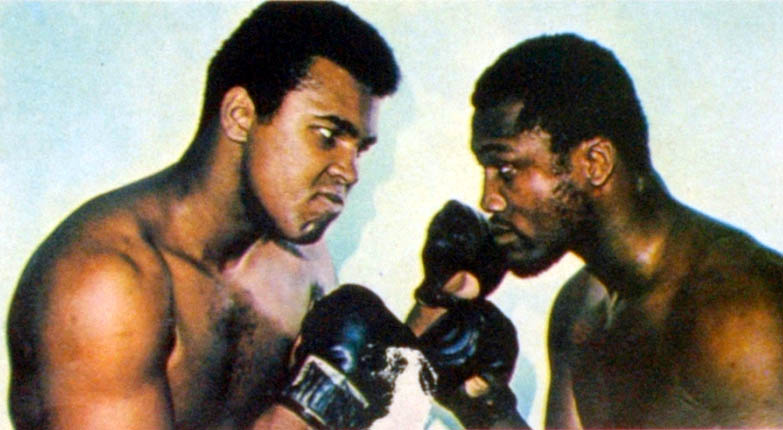
Muhammad Ali and Joe Frazier, public domain, via Wikimedia Commons.
The pandemic seemed like a good time to read the ninety-odd novels of Balzac that comprise The Human Comedy. (Which you can get on your Kindle for ninety-nine cents, by the way.) I was definitely obsessed with Balzac in my first youth. Some lines and ideas of his were then emblazoned on my brain: the ruthless mastery an artist must have over his material to boldly cut and shape it; “the impetuous courage of the South;” the “tenacity of purpose which works miracles when it is single-minded.”
Once, in my first youth (I probably got the phrase “first youth” from Balzac), I was having dinner with my brother, Nick Lemann, and about a dozen of his friends, all journalists like him; I was sitting right smack in the middle of the table, and I was, as I recall it, the only girl. They kept talking about politics, of course, and I wasn’t interested in politics at all and still know nothing about them, so eventually I fished out a Balzac novel from my purse and started pointedly reading it in the middle of dinner at the table, amid their conversation. It was like saying, You can be interested in politics, I am interested in Balzac.
I have no regrets about it. I was making a point! The scene is emblazoned on my brain. It was the only way I could assert myself in that context! It got their attention.
—Nancy Lemann, author of “Diary of Remorse”
Read Nancy Lemann on opera and The Palace Papers.
There’s a moment in the Ken Burns documentary series Muhammad Ali when—it’s ridiculous to say, four hours in and after however much (kinetic, absorbing) footage of boxing—I was suddenly shocked by how hard Ali was punching, and getting punched. It’s the “Thrilla in Manila,” the third and deciding fight between Ali and Joe Frazier, and it’s maybe 120 degrees in the ring under the TV lights and totally, unventilatedly humid under the metal roof. We’re in the ninth round or so and both men are already swollen and sagging and staggering, and then some new footage slides in, archival this time, of the two wearily trading punches, and in grainy sixteen-millimeter Technicolor it’s as if a screen’s been yanked off: you’re riding Ali’s shoulder (these shots were taken from the apron, just outside the ring) and everything you thought you knew about the speed and weight of punches at this level (even these subpar, exhausted punches), their impact against flesh and bone, needs to be scaled up about a thousand percent.
What happened? How does this archival footage feel so real? It got me thinking: all the proximity offered by our modern cameras—extreme zoom, hi-res and -frame rates, 360-degree angle capabilities—works to a counterpurpose: it makes mastery look easy, plausible. Or is that the deeper purpose? To make the average Joe believe that they too could do that—take that punch, hit that forehand, drive, or curveball?
I was reminded of a passage by the great art critic Peter Schjeldahl, one of his last:
One drunken night, a superb painter let me take a brush to a canvas that she said she was abandoning. I tried to continue a simple black stroke that she had started. The contrast between the controlled pressure of her touch and my flaccid smear shocked me, physically. It was like shaking hands with a small person who flips you across a room.
I love this shock, this awe, from someone whose whole life is art and artmaking. I love the idea that consummate skill remains inaccessible, even to the consummate expert looking at it or for it. You’re either in it or you’re not.
So what about writing? It’s hard to imagine any literary critic being judo-flipped by a superb writer in quite the same way. By the whole of a work, sure, or by an organized effect, but not by whatever’s the technical equivalent of a painter painting a basic line (or a boxer throwing a punch, or a violinist playing a note). A word is a word is a word: identical, replicable, accessible, whether put down by a master or a novice. And the putting down of words seems fairly shut off from the kind of sensory epiphany that might shake up your sense of the whole shebang—no way could I take that punch, control that brush or bow.
Still, writing takes no less skill than anything else. For me, the Ali footage was stunning access to what may as well have been God-mode, and it shares with Schjeldahl’s moment more than just a glimpse of mastery in full flow: of what you think you know but you don’t. What if, I wonder, we could access the mastery of the writer Alis out there? What if we could shunt ourselves—shock ourselves—even for a moment, into a real embodiment of the intensity and risk and artistry of their talent at work? What would it feel like? What might it change? Would it matter? Should it?
We can only imagine.
—Nam Le, author of “from ‘36 Ways of Writing a Vietnamese Poem’ ”
from The Paris Review https://ift.tt/RsAw35h
Comments
Post a Comment